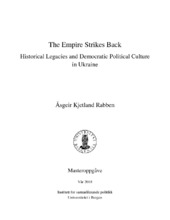The Empire Strikes Back. Historical Legacies and Democratic Political Culture in Ukraine
Master thesis
Permanent lenke
https://hdl.handle.net/1956/18759Utgivelsesdato
2018-06-16Metadata
Vis full innførselSamlinger
Sammendrag
This study investigates how Ukraine’s geographical patterns of democratic political culture are shaped by historical legacies from long defunct empires and states. The thesis’ focus is on what has been called a “natural experiment”, whereby the lands of present-day Ukraine were divided, first between the Habsburg Empire and the Russian Empire (1772-1917), and later between Poland and the Soviet Union (1921-1939). The aim is to find out if the empires and states which ruled over Ukraine in these time periods have left legacies that can explain Ukraine’s regional variations in democratic political culture. The thesis employs theory about how political culture is shaped by societal developments, and how national identity can be a carrier of political values across time. Arguments for why it may be thought that the foreign powers that ruled over Ukraine caused the emergence of distinct democratic political cultures are thoroughly investigated, and a set of expectations are developed. Since historical borders from different time periods nearly overlap, a high level of geographical precision is needed when testing for differences in support for democratic values between historical regions. Two surveys from Kiev International Institute of Sociology allow for a sufficiently high level of precision. It is found a clear threshold in level of support for democratic values along the former border between the Habsburg Empire and the Russian Empire, but no such threshold is found along the former border between Poland and the Soviet Union. It can thus be inferred that a legacy of the Habsburg Empire is a higher level of democratic political culture than that of the Russian Empire, and that a particularly strong support for democratic values in Western Ukraine can be explained by imperial legacies. The thesis contributes with a more precise analysis than what is found in the existing literature, and other possible causes can largely be ruled out.
